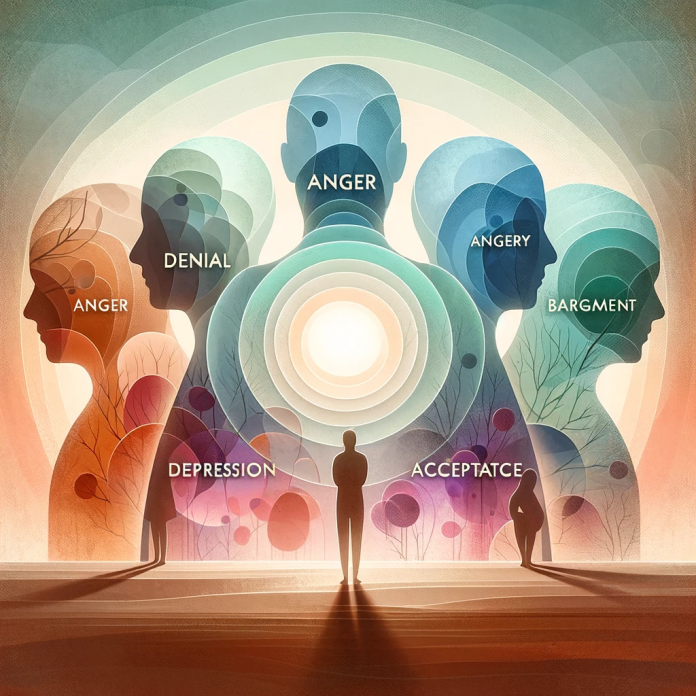Experiencing grief is a universal part of the human experience. It's a complex emotional journey that can be overwhelming and confusing. This article aims to provide a comprehensive understanding of the stages of grief, helping you navigate through this challenging time.
The Concept of Grief
Grief is a natural response to loss. It's the emotional suffering one feels when something or someone the individual loves is taken away. Grief is not limited to the loss of people, but can also be a reaction to the loss of relationships, physical ability, opportunities, or even symbolic losses such as the loss of a dream.
Everyone experiences grief differently. It's a highly individual process and there is no right or wrong way to grieve. The process of grieving can vary depending on a variety of factors, including the individual's personality, coping style, life experience, and the nature of the loss.
The Five Stages of Grief
The five stages of grief, as proposed by Swiss psychiatrist Elisabeth Kübler-Ross in her 1969 book "On Death and Dying", are a widely accepted framework for understanding the grieving process. These stages are not meant to be a rigid framework, but rather a guide that can help individuals understand their feelings and navigate through their grief.
It's important to note that not everyone will go through all these stages, or in the order presented. The stages are not linear and some people may experience several stages in a "roller coaster" effect, switching between two or more stages, returning to one or more several times before reaching acceptance.
Denial
The first stage of grief is denial. In this stage, individuals are trying to make sense of the situation and may deny the reality of the loss. Denial is a common defense mechanism that cushions the immediate shock of the loss, numbing us to our emotions.
People in denial often feel as if they are in a dream or nightmare and can't accept the reality of the situation. This stage is temporary and will lessen as the individual begins to acknowledge and process their emotions.
Anger
As the masking effects of denial begin to wear, reality and its pain re-emerge. The individual may feel intense anger. This anger may be directed toward inanimate objects, complete strangers, friends or family, or even the deceased.
Anger is a necessary stage of the healing process. It's important to understand that this anger is an expression of the pain that the individual is experiencing. It's essential to allow oneself to feel this anger and not suppress these feelings.
Bargaining
During the bargaining stage, individuals often dwell on what could have been done to prevent the loss. Common thoughts are "If only..." and "What if..." statements. Individuals may also try to strike a deal with a higher power in an attempt to postpone the inevitable, and the guilt associated with the loss can exacerbate this stage.
The bargaining stage is a normal reaction to feelings of helplessness and vulnerability and is an attempt to regain control over the situation.
Depression
The fourth stage of grief is depression. This stage is characterized by feelings of sadness and regret. Individuals may have feelings of emptiness, despair, and deep grief. This stage may be accompanied by crying spells, sleep problems, changes in appetite, and feelings of isolation.
Depression after a loss is too often seen as unnatural or something to be snapped out of. It's important to understand that this depression is not a sign of mental illness but is a normal response to a great loss.
Acceptance
The final stage of grief is acceptance. Acceptance is not about being okay with the loss. Instead, this stage is about accepting the reality that our loved one is physically goneand recognizing that this new reality is the permanent reality.
In this stage, individuals may start to look forward and plan out their life without their loved one. Acceptance does not mean that individuals no longer feel the pain of their loss, but rather that they've learned to live with it.
How to Cope with Grief
While grief is a personal and highly individual experience, there are a few strategies that can help individuals cope with their loss. These strategies include seeking out support, expressing feelings, taking care of one's physical health, and understanding that it's okay to grieve.
Remember, it's okay to seek professional help if your grief feels too much to bear. A mental health professional can provide strategies to help navigate through the grieving process.
Conclusion
Understanding the stages of grief can provide a framework to help individuals navigate through their loss. It's important to remember that everyone grieves in their own way and at their own pace. There is no right or wrong way to grieve, and it's okay to seek help if needed.


-banner.png)





